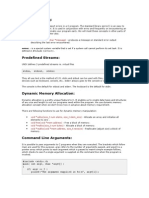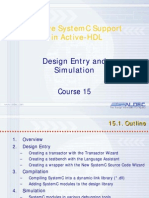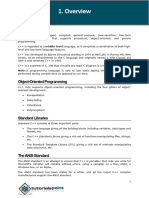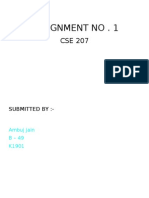Snack Programming
Uploaded by
Arshad NadeemSnack Programming
Uploaded by
Arshad NadeemWriting Extensions to Snack in C/C++
Snack can be extended with new commands that operate on its sound objects. It is also possible to add new sound file formats and filter types. You can even define new kinds of object commands which link to a Snack sound and track changes to it. This is accomplished using the Snack C-library. An example extension can be found in the ext directory of the Snack source distribution together with information on how to build and use them on both Unix and Windows. Source code showing how a speech recognizer can track a Snack sound object can be found here. Below is a minimal example of a command that extends Snack. The code and related files can be found in the ext directory of the Snack distribution.
Example C-code for a Snack extension #include "snack.h" int Square(ClientData cdata, Tcl_Interp *interp, int objc, Tcl_Obj *CONST objv[]) { Sound *sound; int i; /* Get the sound structure for this sound. */ sound = Snack_GetSound(interp, Tcl_GetStringFromObj(objv[0], NULL)); for (i = 0; i < Snack_GetLength(sound); i++) { if ((i/10)%2) { Snack_SetSample(sound, 0, i, 10000); } else { Snack_SetSample(sound, 0, i, -10000); } } return TCL_OK; } /* Initialize the square package and create a new sound command 'square'. The syntax is: sndName square */
EXPORT(int, Square_Init)(Tcl_Interp *interp) { #ifdef USE_TCL_STUBS if (Tcl_InitStubs(interp, "8", 0) == NULL) { return TCL_ERROR; } #endif #ifdef USE_TK_STUBS if (Tk_InitStubs(interp, "8", 0) == NULL) { return TCL_ERROR; } #endif #ifdef USE_SNACK_STUBS if (Snack_InitStubs(interp, "2", 0) == NULL) { return TCL_ERROR; } #endif if (Tcl_PkgProvide(interp, "square", "1.0") != TCL_OK) { return TCL_ERROR; } Snack_AddSubCmd(SNACK_SOUND_CMD, "square", (Snack_CmdProc *) Square, NULL); return TCL_OK; }
Example script using the extension The following Tcl script demonstrates how to use the new 'square' command. #/usr/local/bin/wish # 'info sharedlibext' returns .dll on Windows and .so on most Unix systems load libsquare[info sharedlibext] sound s
s length 10000 s square pack [button .b -text Play -command {s play}]
Building the extension The example archive contains a Makefile and configure-script usable on all Unix platforms. Here is a step by step guide for Windows users using MS Visual C++ 6.0.
1. 2. 3. 4. 5. 6. 7. 8.
Create an empty Win32 Dynamic-Link Library project. (File/New...) Name it 'Square' and click Ok and then Finish. Add the file square.c to the project (Project/Add to project/Files...) Specify the locations of the Snack and Tcl include files. (Project/Settings..., C/C++ tab, Category: Preprocessor, Additional include directories.) With a default installation, this would be C:\Program Files\Tcl\include\,C:\Program Files\Snack2.0\include\ Specify the stubs definitions (Project/Settings... C/C++ tab, Category: General, Preprocessor definitions.) USE_SNACK_STUBS, USE_TCL_STUBS, USE_TK_STUBS Specify the Snack and Tcl link libraries (Link tab, Category: Input, Object/library modules) tclstub83.lib tkstub83.lib snackstub20.lib and their locations (Additional library path). With a default installation, this would be C:\Program Files\Tcl\lib\,C:\Program Files\Snack2.0\lib\. Specify the output file name of the dll to be libsquare.dll. (Category: General, Output file name) Build the extension. Try the extension using the script above. You will have to edit the script and specify the full path to the dll in the load command.
You might also like
- Bomag Hypac C766 C C778 B Workshop Service Repair Manual Download100% (2)Bomag Hypac C766 C C778 B Workshop Service Repair Manual Download602 pages
- TM352 TMA SP 23 - 24 Riyadh Ahmed 21412393No ratings yetTM352 TMA SP 23 - 24 Riyadh Ahmed 2141239320 pages
- JNTU B.tech Computer Networks Lab Manual All Programs100% (3)JNTU B.tech Computer Networks Lab Manual All Programs53 pages
- Software Engineering - PPT - Unit 1 - Class 1No ratings yetSoftware Engineering - PPT - Unit 1 - Class 111 pages
- 84227127-6T-CMOS-SRAM-CELL-Design-ReportNo ratings yet84227127-6T-CMOS-SRAM-CELL-Design-Report25 pages
- Computer Science Programming Through C++ .: Aditi JohariNo ratings yetComputer Science Programming Through C++ .: Aditi Johari25 pages
- Module 3 Program Development Tools in The tms320f28335 1 PDFNo ratings yetModule 3 Program Development Tools in The tms320f28335 1 PDF47 pages
- Compile TLC Python Before You Start: Try Activetcl ActivestateNo ratings yetCompile TLC Python Before You Start: Try Activetcl Activestate4 pages
- How To Add A System Call in Linux KernelNo ratings yetHow To Add A System Call in Linux Kernel19 pages
- Lovely Professional University: Term Paper of Foundation of Computer ProgrammingNo ratings yetLovely Professional University: Term Paper of Foundation of Computer Programming21 pages
- CompTIA Linux+ Guide to Linux Certification 4th Edition Eckert Test Bankdownload100% (5)CompTIA Linux+ Guide to Linux Certification 4th Edition Eckert Test Bankdownload38 pages
- Job Sheet 5 Muhamad Hakimi Azali Bin AzlanNo ratings yetJob Sheet 5 Muhamad Hakimi Azali Bin Azlan14 pages
- CompTIA Linux+ Guide to Linux Certification 4th Edition Eckert Test Bankpdf download100% (3)CompTIA Linux+ Guide to Linux Certification 4th Edition Eckert Test Bankpdf download41 pages
- Unix Shell Scripting - in An Oracle EnvironmentNo ratings yetUnix Shell Scripting - in An Oracle Environment22 pages
- CompTIA Linux+ Guide to Linux Certification 4th Edition Eckert Test Bankinstant download100% (5)CompTIA Linux+ Guide to Linux Certification 4th Edition Eckert Test Bankinstant download18 pages
- Complete Answer Guide for CompTIA Linux+ Guide to Linux Certification 4th Edition Eckert Test Bank100% (16)Complete Answer Guide for CompTIA Linux+ Guide to Linux Certification 4th Edition Eckert Test Bank46 pages
- CompTIA Linux+ Guide to Linux Certification 4th Edition Eckert Test Bank - Read Now Or Download For A Complete Experience100% (3)CompTIA Linux+ Guide to Linux Certification 4th Edition Eckert Test Bank - Read Now Or Download For A Complete Experience45 pages
- Unix and Advance Topics in C Programming: A Simple C ProgramNo ratings yetUnix and Advance Topics in C Programming: A Simple C Program15 pages
- What Are The Different Standard Given by POSIX ? What Is POSIX ?No ratings yetWhat Are The Different Standard Given by POSIX ? What Is POSIX ?7 pages
- Trần Quốc Tuấn Duy_B2306662_CT104H_Lab02No ratings yetTrần Quốc Tuấn Duy_B2306662_CT104H_Lab0222 pages
- Mastering Go A Practical Guide to Developers: A Practical Guide to DevelopersFrom EverandMastering Go A Practical Guide to Developers: A Practical Guide to DevelopersMiguel Miranda de MattosNo ratings yet
- UNIX Shell Programming Interview Questions You'll Most Likely Be AskedFrom EverandUNIX Shell Programming Interview Questions You'll Most Likely Be AskedNo ratings yet
- Identifying Objects Using RF Transmitters and Receivers, and Retrieving DataNo ratings yetIdentifying Objects Using RF Transmitters and Receivers, and Retrieving Data6 pages
- Intelligent Addressable Fire Alarm System: IFC-3030 Shown in CAB-C4 Backbox With 640-Character DisplayNo ratings yetIntelligent Addressable Fire Alarm System: IFC-3030 Shown in CAB-C4 Backbox With 640-Character Display8 pages
- Civil Guruji: Civil Engineers Training InstituteNo ratings yetCivil Guruji: Civil Engineers Training Institute6 pages
- Step-By-Step Guide Build & Deploy Ethereum Blockchain Smart Contract100% (2)Step-By-Step Guide Build & Deploy Ethereum Blockchain Smart Contract44 pages
- 4546-1688752552456-Unit 28 - Cloud-Computing - Assignment 2023No ratings yet4546-1688752552456-Unit 28 - Cloud-Computing - Assignment 202313 pages
- SUB: 18ME25 Elements of Mech Engg Faculty: Balachandra Bingi Module 1 &2 No. MarksNo ratings yetSUB: 18ME25 Elements of Mech Engg Faculty: Balachandra Bingi Module 1 &2 No. Marks3 pages
- (Ebook) Quantum Software Engineering by Manuel A. Serrano, Ricardo Pérez-Castillo, Mario Piattini ISBN 9783031053238, 3031053230 - Discover the ebook with all chapters in just a few seconds100% (2)(Ebook) Quantum Software Engineering by Manuel A. Serrano, Ricardo Pérez-Castillo, Mario Piattini ISBN 9783031053238, 3031053230 - Discover the ebook with all chapters in just a few seconds76 pages
- Construction Equipment: Amrutha K 4SN16AT006 Sem Viii Sec ANo ratings yetConstruction Equipment: Amrutha K 4SN16AT006 Sem Viii Sec A25 pages

























































































